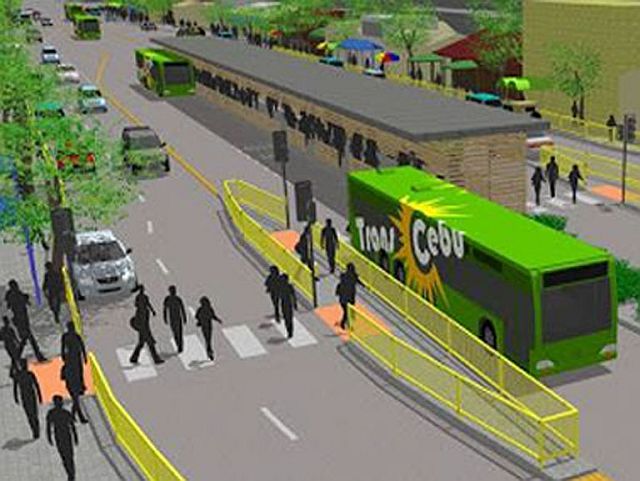
BRT Cebu image. (Source DOTC)
(CONCLUSION)
The P10.6 billion Cebu Bus Rapid Transit (BRT) project, a planned mass transit system for Cebu City located within the greater Cebu metropolitan area, had its ups and downs in 2016.
While its implementing office was able to launch a livelihood program for the families of drivers and operators of public utility jeepneys (PUJs) who will be affected by the program, delays were experienced in the procurement process for the BRT technical support consultant.
The consultant’s services are to be bided out by the national government through its Department of Transportation (DOTr).
But according to Cebu BRT project head Rafael Yap, the national government under former President Benigno Aquino III run into problems when it prepared the documentary requirements to start the bidding process.
The delay may push back the project’s implementation by about six months, said Yap.
The consultant’s services are needed to help manage the project which is expected to be the first of its kind in the Philippines.
The consultant will assist in setting up the larger road-based public transport reform program through public transport service planning, operations and management; infrastructure design, area traffic control, traffic engineering, and transportation systems.
Aside from engaging the services of the consultant for business planning, environmental and social safeguards are also needed for the successful implementation of the BRT.
“The Cebu BRT project will push through albeit with delays, because the same is a sovereign agreement between the Philippine government and the World Bank,” Yap said.
BRT developers note the potential of having a larger network comprising of not just Cebu City but neighboring Lapu-Lapu, Mandaue and Talisay.
The project, first proposed by Mayor Tomas Osmeña in the 1990s, is funded by a loan grant from the World Bank through its Clean Technology Fund.
Formal planning for the project by the Department of Transportation and Communication (DOTC) began in 2008 with President Aquino later putting it among his top 16 Public-Private Partnership projects to pursue.
Yap said that while the first phase of the BRT implementation, originally targeted in the last quarter of 2016, suffered setbacks – canceling the project was out of the question as doing so would have “severe consequences” to the country’s standing before the international community.
The first phase of the BRT project will be along Osmeña Blvd.
Yap hoped the bidding for the contractor can be conducted early this year so as to begin the first phase within 2017.
The Cebu BRT project is expected to be operational by early 2019.
LUDO PLANT site. Children play on the water just outside the Ludo Corp. compound in Barangay Sawang Calero, Cebu City, in this photo taken in April 2016. (CDN PHOTO/FERDINAND EDRALIN)
Yes or no to coal?
Last December, Ludo Power Corp. (LPC) revived its plans to build and operate a 300-megawatt coal-fired power plant in the highly populated village of Sawang Calero, Cebu City.
But unlike its first attempt with the previous City Council, LPC now wants to make sure that there would be no more problems in the proposal.
LPC’s first move was to request the new Cebu City Council for the land use reclassification of the proposed area where the power plant will be built from a low intensity industrial (I-1) district into a medium or high intensity industrial (I-2) district.
The move would allow LPC to operate the power plant in the area since under the city’s zoning ordinance, power plants could only be constructed in districts classified as I-2.
The previous Cebu City Council had initially turned down the project when it was first proposed last April.
The then BOPK-dominated council, through former councilor and environment committee head Nida Cabrera, rejected the project amid mounting opposition from residents in the area within which LPC planned to build its power plant.
With a new set of City Hall officials following the May 2016 elections, the future of LPC’s plans hangs in the balance.
It remains unclear whether or not the project will pass the scrutiny of the new city council whose task will again be to say yes or no to coal.
Indeed, 2016 was an eventful year in Cebu City.
And with Mayor Osmeña still within the first year of his fresh mandate, expectations are high that the man, proclaimed as a wise visionary by his supporters, will steer Cebu City in the right direction – notwithstanding the daily political intramurals between two wildly opposing parties at City Hall.